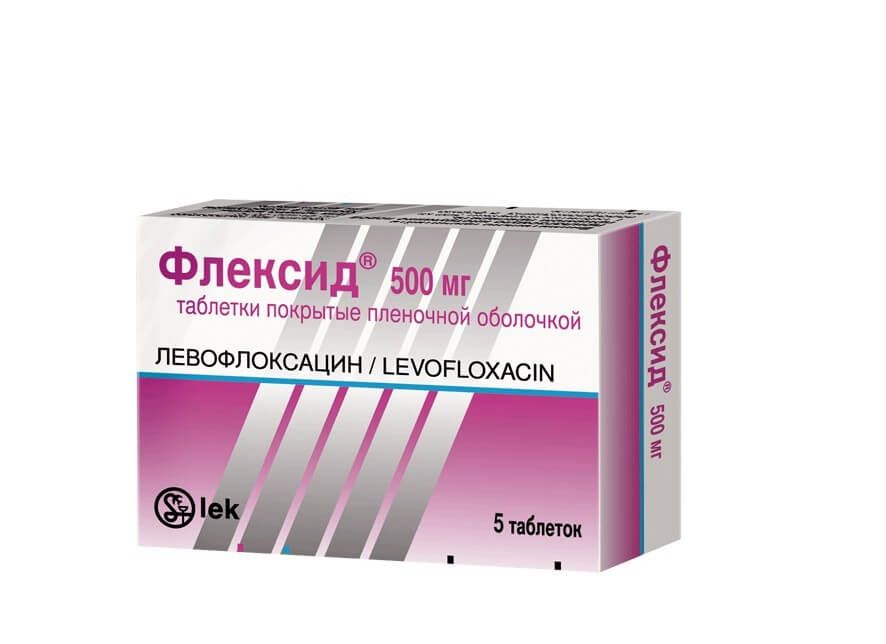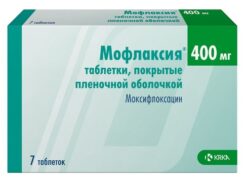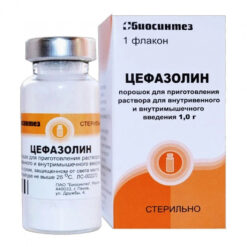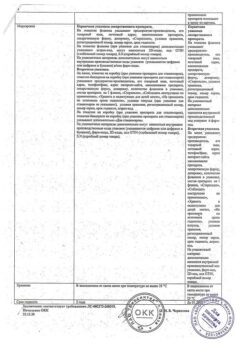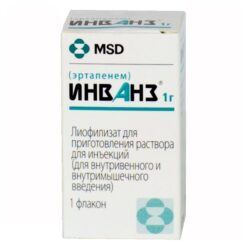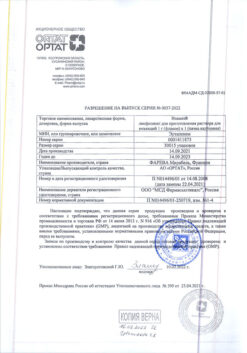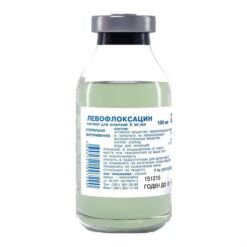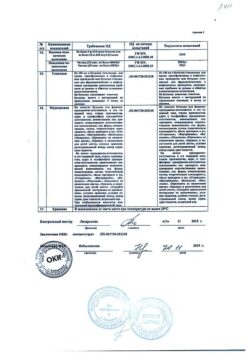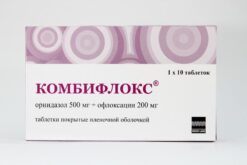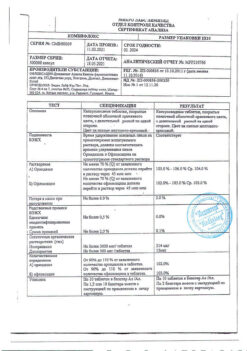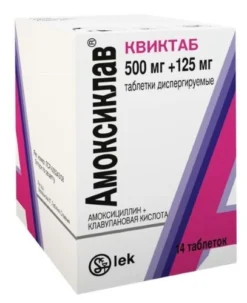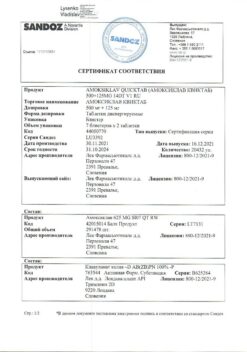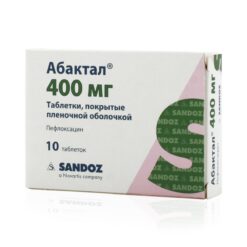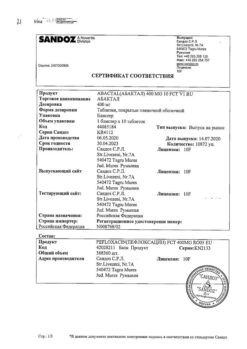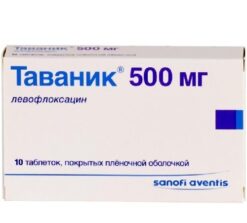No products in the cart.
Description
Respiratory tract infections, maxillary sinusitis, Lung inflammation (pneumonia), Boils, Inflammation of the female reproductive organs, Bronchitis, Urinary tract infections, Infectious diseases, Tuberculosis, Skin infections
Infections caused by strains of microorganisms sensitive to levofloxacin:
– infections of ENT organs (acute sinusitis);
– infections of the lower respiratory tract (exacerbation of chronic bronchitis, out-of-hospital pneumonia);
– infections of the urinary tract;
– Chronic bacterial prostatitis;
– Skin and soft tissue infections;
– In the complex therapy of drug-resistant forms of tuberculosis.
.
Indications
Indications
Infections caused by strains of microorganisms sensitive to levofloxacin:
• infections of the ENT organs (acute sinusitis);
• lower respiratory tract infections (exacerbation of chronic bronchitis, community-acquired pneumonia);
• urinary tract infections;
• chronic bacterial prostatitis;
• skin and soft tissue infections;
• as part of complex therapy of drug-resistant forms of tuberculosis.
Pharmacological effect
Pharmacological effect
Pharmacological group
Quinolones/fluoroquinolones
Special instructions
Special instructions
The prevalence of acquired resistance in cultured strains of microorganisms may vary by geographic region and over time. In this regard, information is required on the resistance of microorganisms to the drug in a particular country. For the treatment of severe infections or if treatment is ineffective, a microbiological diagnosis must be established with the isolation of the pathogen and determination of its sensitivity to levofloxacin.
There is a high likelihood that methicillin-resistant Staphylococcus aureus will be resistant to fluoroquinolones, including levofloxacin. Therefore, levofloxacin is not recommended for the treatment of known or suspected infections caused by methicillin-resistant Staphylococcus aureus if laboratory tests have not confirmed the sensitivity of this microorganism to levofloxacin. Levofloxacin can cause serious, potentially fatal hypersensitivity reactions (angioedema, anaphylactic shock), even with initial doses (see section “Side effects”). Patients should stop taking the drug immediately and consult a doctor.
Cases of severe bullous skin reactions such as Stevens-Johnson syndrome or toxic epidermal necrolysis have been observed while taking levofloxacin (see section “Side effects”). In case of development of any reactions from the skin and mucous membranes, the patient should immediately consult a doctor and not continue treatment until his consultation.
Cases of hepatic necrosis, including the development of fatal liver failure, have been reported with the use of levofloxacin, mainly in patients with severe underlying diseases, such as sepsis (see section “Side effects”). Patients should be warned to stop treatment and seek immediate medical attention if signs and symptoms of liver damage occur, such as anorexia, jaundice, dark urine, itching, and abdominal pain.
Flexid® tablets must be taken 2 hours before or 2 hours after taking iron salts, zinc salts, sucralfate or didanosine (only those didanosine preparations that contain magnesium and aluminum as excipients), since a decrease in its absorption may occur.
In patients simultaneously taking indirect anticoagulants, coumarin derivatives, it is necessary to monitor blood clotting parameters.
In rare cases observed during treatment with quinolones, tendinitis can lead to rupture of ligaments, especially the Achilles tendon. This side effect occurs within 48 hours after the start of therapy. Elderly people and patients taking glucocorticosteroids are at increased risk of developing tendonitis. Therefore, during treatment with levofloxacin, careful monitoring of the condition of such patients is necessary.
If tendinitis is suspected (patients should be advised of its symptoms), Flexid® tablets should be stopped immediately and appropriate treatment (e.g. immobilization) initiated.
Diarrhea (especially if severe, persistent and/or bloody) during or after taking Flexid® tablets may be a symptom of disease caused by Clostridium difficile, the most severe form of which is pseudomembranous colitis. If pseudomembranous colitis is suspected, Flexid® tablets should be stopped immediately and symptomatic treatment (eg, oral vancomycin) should be given. In this condition, drugs that inhibit peristalsis are contraindicated.
Combination therapy is required to treat hospital-acquired infections caused by P.aeruginosa.
During treatment with Flexid®, direct sunlight and artificial ultraviolet radiation (solarium) must be avoided to avoid the development of photosensitivity reactions.
It should be borne in mind that in patients with a history of brain damage (stroke, severe traumatic brain injury), seizures may develop; in patients with glucose-6-phosphate dehydrogenase deficiency, there is a risk of hemolytic reactions.
Since levofloxacin is excreted mainly through the kidneys, monitoring of renal function as well as adjustment of the dosage regimen is required in patients with impaired renal function.
QT interval prolongation has been reported in patients receiving fluoroquinolones, including levofloxacin. When using fluoroquinolones, including levofloxacin, caution should be exercised in patients with known risk factors for QT interval prolongation: uncorrected fluid and electrolyte imbalance (hypokalemia, hypomagnesemia); congenital long QT syndrome; heart disease (heart failure, myocardial infarction, bradycardia); concomitant use of medications that can prolong the QT interval.
Elderly and female patients may be more sensitive to drugs that prolong the QT interval. Therefore, fluoroquinolones, including Flexid® tablets, should be used with caution.
In patients with diabetes mellitus receiving oral hypoglycemic agents (for example, glibenclamide) or insulin, the risk of developing hypo-/hyperglycemia increases when using levofloxacin. Cases of hypoglycemic coma have been reported. In patients with diabetes mellitus, monitoring of blood glucose concentrations is required.
Sensory and sensorimotor peripheral neuropathy, which may have a rapid onset, has been reported in patients receiving fluoroquinolones, including levofloxacin. If the patient develops symptoms of neuropathy, the use of Flexid® tablets should be discontinued (minimizes the possible risk of developing irreversible changes). Flexid® tablets should not be used in patients with pseudoparalytic myasthenia gravis.
With the use of quinolones, including levofloxacin, the development of psychotic reactions has been reported, which in very rare cases progressed to the development of suicidal ideation and behavior disorders with self-harm (sometimes after taking a single dose of levofloxacin). If such reactions develop, treatment with Flexid® tablets should be stopped and appropriate therapy should be prescribed. The drug should be prescribed with caution to patients with psychosis or patients with a history of mental illness.
If any visual impairment develops, immediate consultation with an ophthalmologist is necessary.
In severe community-acquired pneumonia caused by Streptococcus pneumoniae, Flexid® tablets may not provide an optimal therapeutic effect.
Levofloxacin can inhibit the growth of Mycobacterium tuberculosis, so a false negative result of a bacteriological test for tuberculosis is possible.
In patients taking Flexid® tablets, the determination of opiates in urine may lead to false-positive results, which should be confirmed by more specific methods.
Impact on the ability to drive vehicles and perform other activities that require concentration and speed of psychomotor reactions
During treatment with levofloxacin, dizziness, blurred vision, and confusion may occur, so caution should be exercised when driving vehicles and performing other potentially hazardous activities that require increased concentration and speed of psychomotor reactions.
Active ingredient
Active ingredient
Levofloxacin
Composition
Composition
1 table contains levofloxacin (in the form of hemihydrate) 500 mg;
excipients:
lactose monohydrate,
povidone,
sodium carboxymethyl starch,
talc,
silicon dioxide colloidal anhydrous,
croscarmellose sodium,
glyceryl dibehenate;
shell composition:
hypromellose, hyprolose, macrogol 6000, iron oxide yellow, iron oxide red, titanium dioxide, talc
Pregnancy
Pregnancy
During pregnancy, the use of Flexid® is contraindicated.
It is unknown whether levofloxacin passes into breast milk, therefore, due to the possible risk of damage to the cartilage tissue of the growing body, the issue of stopping breastfeeding should be considered during treatment with the drug.
Contraindications
Contraindications
• hypersensitivity to levofloxacin or other quinolones and/or other components of the drug;
• epilepsy;
• tendon lesions that occurred during previous treatment with fluoroquinolones;
• rare hereditary forms of lactose intolerance, lactase deficiency or glucose/galactose malabsorption (since the composition contains lactose);
• childhood and adolescence (up to 18 years);
• pregnancy and breastfeeding;
• myasthenia gravis.
With caution
Levofloxacin should be used with caution in patients with renal failure; with glucose-6-phosphate dehydrogenase deficiency (increases the risk of hemolytic anemia); with diabetes; with a history of psychosis and other mental disorders; with known risk factors for QT interval prolongation (congenital long QT syndrome; concomitant use of drugs that can prolong the QT interval (for example, class IA and III antiarrhythmic drugs, tricyclic antidepressants, macrolides, antipsychotics); elderly patients and women may be more sensitive to drugs that prolong the QT interval); with uncorrected electrolyte disturbances (eg, hypomagnesemia, hypokalemia, hyponatremia); in elderly patients; patients with heart disease (eg, heart failure, myocardial infarction, bradycardia); with a predisposition to convulsive reactions (cerebral atherosclerosis, cerebrovascular accidents (history), organic diseases of the central nervous system); hepatic porphyria; while taking medications that lower the threshold for convulsive readiness of the brain (fenbufen and other similar non-steroidal anti-inflammatory drugs (NSAIDs), theophylline); while taking drugs that affect tubular secretion (for example, probenecid and cimetidine).
Side Effects
Side Effects
The following side effects were classified as follows: very common (>10%), common (1-10%), uncommon (0.1-1%), rare (0.01-0.1%), very rare (On the part of the digestive system: common – nausea, diarrhea (including blood), increased activity of liver enzymes (ALT, AST); common – decreased appetite, vomiting, pain in abdomen, dyspepsia, hyperbilirubinemia; rare – enterocolitis, pseudomembranous colitis; very rare – hypoglycemia, hepatitis.
From the nervous system: uncommon – headache, dizziness, sleep disturbance; rare – paresthesia, tremor, anxiety, agitation, confusion, convulsions; very rare – hallucinations, extrapyramidal disorders and other coordination disorders.
From the senses: very rare – disturbances of vision, hearing, smell, taste and tactile sensitivity.
From the cardiovascular system: rare – tachycardia, hypotension; very rare – vascular collapse.
From the musculoskeletal system: rare – arthralgia, myalgia, tendinitis; very rare – tendon rupture (for example, Achilles tendon), muscle weakness (of particular importance for patients with myasthenia gravis); in some cases – rhabdomyolysis.
From the urinary system: uncommon – hypercreatininemia; very rare – interstitial nephritis, deterioration of kidney function up to acute renal failure.
From the blood system and hematopoietic organs: uncommon – eosinophilia, leukopenia; rare – neutropenia, thrombocytopenia; very rare – agranulocytosis; in some cases – hemolytic anemia, pancytopenia.
Allergic reactions: uncommon – itching, skin rash; rare – urticaria, bronchospasm, shortness of breath; very rare – angioedema, hypotension, anaphylactic shock, allergic pneumonitis, photosensitivity; in some cases – Stevens-Johnson syndrome, toxic epidermal necrolysis (Lyell’s syndrome), erythema multiforme.
Other: uncommon – asthenia; very rare – fever, vasculitis.
Interaction
Interaction
Iron salts, zinc salts, antacids containing magnesium or aluminum, didanosine (only those didanosine preparations that contain magnesium and aluminum as excipients) significantly reduce the absorption of levofloxacin when taken simultaneously.
With the simultaneous use of levofloxacin and iron salts, zinc salts, antacids containing magnesium or aluminum, didanosine, it is recommended to prescribe the latter 2 hours after taking levofloxacin (or 2 hours before taking levofloxacin).
Calcium salts have little effect on the oral absorption of levofloxacin.
Sucralfate significantly reduces the bioavailability of levofloxacin. When using levofloxacin and sucralfate simultaneously, it is recommended to prescribe the latter 2 hours after taking levofloxacin.
No pharmacokinetic interaction was detected between levofloxacin and theophylline.
However, when quinolones are used simultaneously with theophylline, with NSAIDs and other drugs that lower the seizure threshold, the seizure threshold may decrease.
In the presence of fenbufen, the concentration of levofloxacin is approximately 13% higher than when used as monotherapy.
With concomitant use of levofloxacin, T1/2 of cyclosporine increases by 33%. When used simultaneously with indirect anticoagulants, coumarin derivatives (eg, warfarin), an increase in blood clotting (prothrombin time/international normalized ratio (INR)) and/or bleeding is observed.
Cimetidine and probenecid, due to blocking tubular secretion, reduce the renal clearance of levofloxacin by 24% and 34%, respectively, so levofloxacin should be used with caution concomitantly with drugs that affect tubular secretion (for example, probenecid and cimetidine), especially in patients with impaired renal function.
Levofloxacin may prolong the QT interval, so caution should be exercised when used concomitantly with class IA and III antiarrhythmic drugs, tricyclic antidepressants, macrolides and antipsychotics.
Glucocorticosteroids increase the risk of tendon rupture.
The concomitant use of calcium carbonate, glibenclamide, ranitidine, and digoxin did not have a clinically significant effect on the pharmacokinetics of levofloxacin.
Overdose
Overdose
Symptoms: nausea, erosions of the gastrointestinal mucosa, confusion, dizziness, loss of consciousness, hallucinations, tremors and convulsions, prolongation of the QT interval.
Treatment: symptomatic; monitoring ECG parameters; prescribing antacids; hemodialysis is ineffective; there is no specific antidote.
Storage conditions
Storage conditions
At a temperature not exceeding 25 °C
Shelf life
Shelf life
3 years
Manufacturer
Manufacturer
Lek d.d., Slovenia
Additional information
| Shelf life | 3 years |
|---|---|
| Conditions of storage | At a temperature not exceeding 25 °C |
| Manufacturer | Lek d.d., Slovenia |
| Medication form | pills |
| Brand | Lek d.d. |
Related products
Buy Flexid, 500 mg 5 pcs. with delivery to USA, UK, Europe and over 120 other countries.

